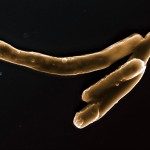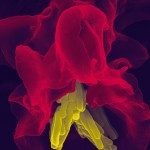Lien vers Pubmed [PMID] – 24604822
J. Infect. Dis. 2014 Sep;210(5):824-33
Granulomas are the hallmark of Mycobacterium tuberculosis infection. As the host fails to control the bacteria, the center of the granuloma exhibits necrosis resulting from the dying of infected macrophages. The release of the intracellular pool of nucleotides into the surrounding medium may modulate the response of newly infected macrophages, although this has never been investigated. Here, we show that extracellular adenosine triphosphate (ATP) indirectly modulates the expression of 272 genes in human macrophages infected with M. tuberculosis and that it induces their alternative activation. ATP is rapidly hydrolyzed by the ecto-ATPase CD39 into adenosine monophosphate (AMP), and it is AMP that regulates the macrophage response through the adenosine A2A receptor. Our findings reveal a previously unrecognized role for the purinergic pathway in the host response to M. tuberculosis. Dampening inflammation through signaling via the adenosine A2A receptor may limit tissue damage but may also favor bacterial immune escape.







